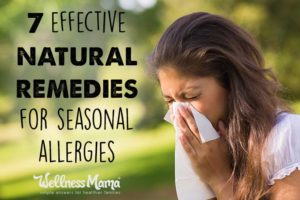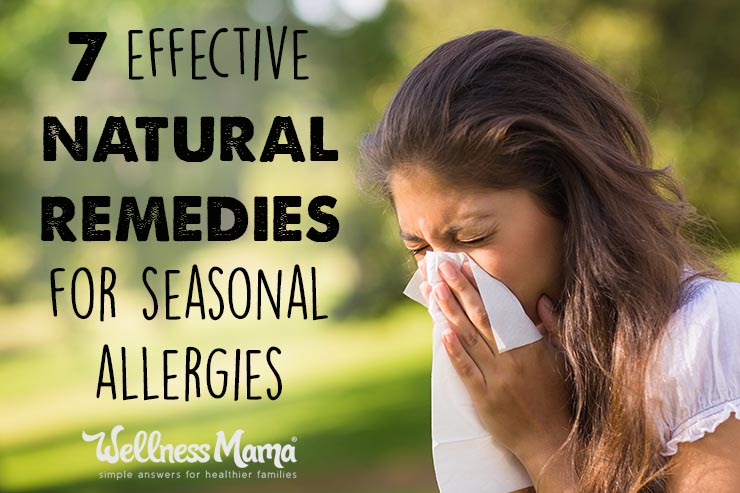
Many people unnecessarily suffer from seasonal allergies when a few simple remedies can offer a lot of allergy relief:
As prime allergy season approaches (at least in our area) I’m sharing the natural remedies that I’ve found to be the most effective for seasonal allergies and that I use when needed. These won’t be as immediately effective as a medication, but over the long-term have lessened my seasonal allergies greatly.
Natural Allergy Relief
These simple natural remedies have been very effective for allergy relief in our family. Different people seem to benefit from different remedies, so it might be worth trying more than one of these to see which works best for you.
1. Apple Cider Vinegar
Apple cider vinegar is an age old remedy that is often recommended for a variety of health conditions. I’ve personally used it for allergy relief (and heartburn relief) with great success. The theory is that its ability to reduce mucous production and cleanse the lymphatic system makes it useful for allergies. It is also said to help digestion, weight loss and more so it is worth a try!
What I did: When allergies hit, I mixed a teaspoon of organic, unfiltered apple cider vinegar with “The Mother” (that part is important) into a glass of water and drank this three times a day. “The Mother” is simply a colony of beneficial bacteria present in some organic and unfiltered ACV brands. Check the label, it should list if it contains it.
2. Neti Pot and Saline Rinse
I haven’t personally tried the Neti pot because I’m a big scaredy cat about pouring things in my nose, but I have friends who swear by it, and I’ve used saline nasal spray before. (If you use one, I’d love to hear your experience in the comments!) The basic theory is that you use a Neti Pot filled with a sterile saline solution to flush out the sinuses of allergens and irritations.
Surprisingly, I’ve heard this recommended by conventional and alternative doctors, and it seems that it doesn’t really have a downside.
To use: Either use a pre-made saline rinse or make your own by dissolving 1 teaspoon of himalayan or sea salt in a quart of boiled distilled water. Cool completely and put in the Neti Pot. Pour through one nostril and let it drain out the other.
3. Quercetin
Quercetin is a natural bioflavonoid that is said to help stabilize mast cells to keep them from releasing histamine. It is also a potent antioxidant that is said to help reduce inflammation. It is best used as a long term remedy and many people start taking it about 4-6 weeks before allergy season to help prevent allergy symptoms.
As with any herb, you should check with your doctor before using, especially if you have a liver problem, are pregnant, or are on hormonal contraceptives.
To Use: Though Quercetin is naturally found in foods like citrus and broccoli, it is very difficult to get the amount needed to relive allergies from food alone. A supplemental dose can be helpful for preventing allergies or helping acute symptoms. Not recommended during pregnancy or nursing though some practitioners feel it is safe after the first trimester and while nursing.
4. Nettle Leaf
Nettle leaf is another natural antihistamine that can be very effective as it naturally blocks the body’s ability to produce histamine. It grows in many places and can be made in to a tincture or tea, but for allergy relief, capsules made from dried nettle leaves are the easiest and most effective option.
Nettle leaf can also be used in combination with other herbs to make a soothing herbal tea for allergy relief. It is often mixed with peppermint leaf and sometimes red raspberry leaf to make a refreshing allergy relief tea.
What I do: I often include nettle in homemade herbal tea during allergy season (recipe at the bottom of this post) and use capsules for acute relief of allergy symptoms.
5. Probiotics
Allergies are the result of an imbalance in the immune system that causes the body to react too strongly to a stimuli. New research links the presence of beneficial bacteria in the gut with reduced incidence of allergies.
Evidence is even emerging that a mother’s gut bacteria during pregnancy and nursing can impact a child’s likelihood of getting allergies throughout life.
While we can’t do much about our mothers’ diets while they were pregnant, balancing gut bacteria now and consuming enough beneficial bacteria can have a positive effect on allergies now.
What I do: I make sure we consume a varied diet that includes fermented foods and drinks like Kombucha or Kefir, which can hep boost gut bacteria. We also take a high quality probiotic capsule.
6. Local Honey
There isn’t much scientific evidence to back this one, but there seems to be a lot of anecdotal evidence from people who have tried it. (Even Mark Sisson weighed in on the subject here). The theory is that consuming local honey from where you live will help your body adapt to the allergens in the environment there. This is supposed to work like a natural allergy “shot” and doesn’t seem to have a downside.
What I do: Consume a teaspoon or more of raw, unprocessed local honey from as close to where you actually live as possible. Do this one or more times a day to help relieve symptoms. It is often suggested to start this a month or so before allergy season.
7. Diet Changes
After our experience, I’d definitely encourage this as an option, especially for severe allergies or those in need of gut healing/rebalancing.



























